Modal
Modals focus the user’s attention exclusively on one task or piece of information by using a window that is displayed on top of the page content.
Live demo
This live demo contains only a preview of functionality and styles available for this component. View the full demo on Storybook for additional information such as its version, controls, and API documentation.
Accessibility testing statusFor every latest release, Carbon runs tests on all components to meet the accessibility requirements. These different statuses report the work that Carbon has done in the back end. These tests appear only when the components are stable.
For every latest release, Carbon runs tests on all components to meet the accessibility requirements. These different statuses report the work that Carbon has done in the back end. These tests appear only when the components are stable.
Overview
Modals are a type of dialog because it is a conversation between the user and the system. Use a modal to present critical information or request user input that’s needed to complete a user’s workflow. Modals interrupt a user’s workflow for short and non-frequent tasks, such as editing or management tasks. When the modal is open, the user is blocked from the on-page content and can’t return to their previous workflow until the modal task is completed or the user dismisses the modal. While effective when used correctly, modals should be used sparingly to limit disrupting the user. Therefore, if a user needs to repeatably perform a task, consider making the task completable on the main page.
When to use
Require an immediate response from the user
Use a dialog to request information that is preventing the system from continuing a user-initiated process.
Notify the user of urgent information
Use a modal to notify the user of urgent information concerning their current work. Modals are commonly used to report system errors or convey a consequence of a user’s action.
Confirm a user decision
Use a modal to confirm user decisions. Clearly describe the action being confirmed and explain any potential consequences that it may cause. Both the title and the button should reflect the action that will occur. If the action is destructive or irreversible, then use a transactional danger modal.
Variants
| Variant | Usage |
|---|---|
| Passive | Presents information the user needs to be aware of concerning their current workflow. Contains no actions for the user to take. |
| Transactional | Requires an action to be taken for the modal to be completed and closed. Contains a cancel and primary action buttons. |
| Danger | A specific variant of transactional modal used for destructive or irreversible actions. |
| Acknowledgment | System requires an acknowledgement of the information from the user. Contains only a single button, commonly OK. |
| Progress | Requires several steps to be completed before it can be closed. Contains a cancel, previous, and next or completion buttons, such as Complete or Done. |
Feature flags
A feature flag was added to the modal component to improve accessibility and changes parts of its functionality, not its visual appearance. For code-specific feature flag information, refer to the Code tab. The current modal is not being deprecated, but teams are encouraged to use the feature flag modal for their products moving forward. Once the next major release (v12) is released in the future, this feature flag will become the default version of the component.
Formatting
Anatomy
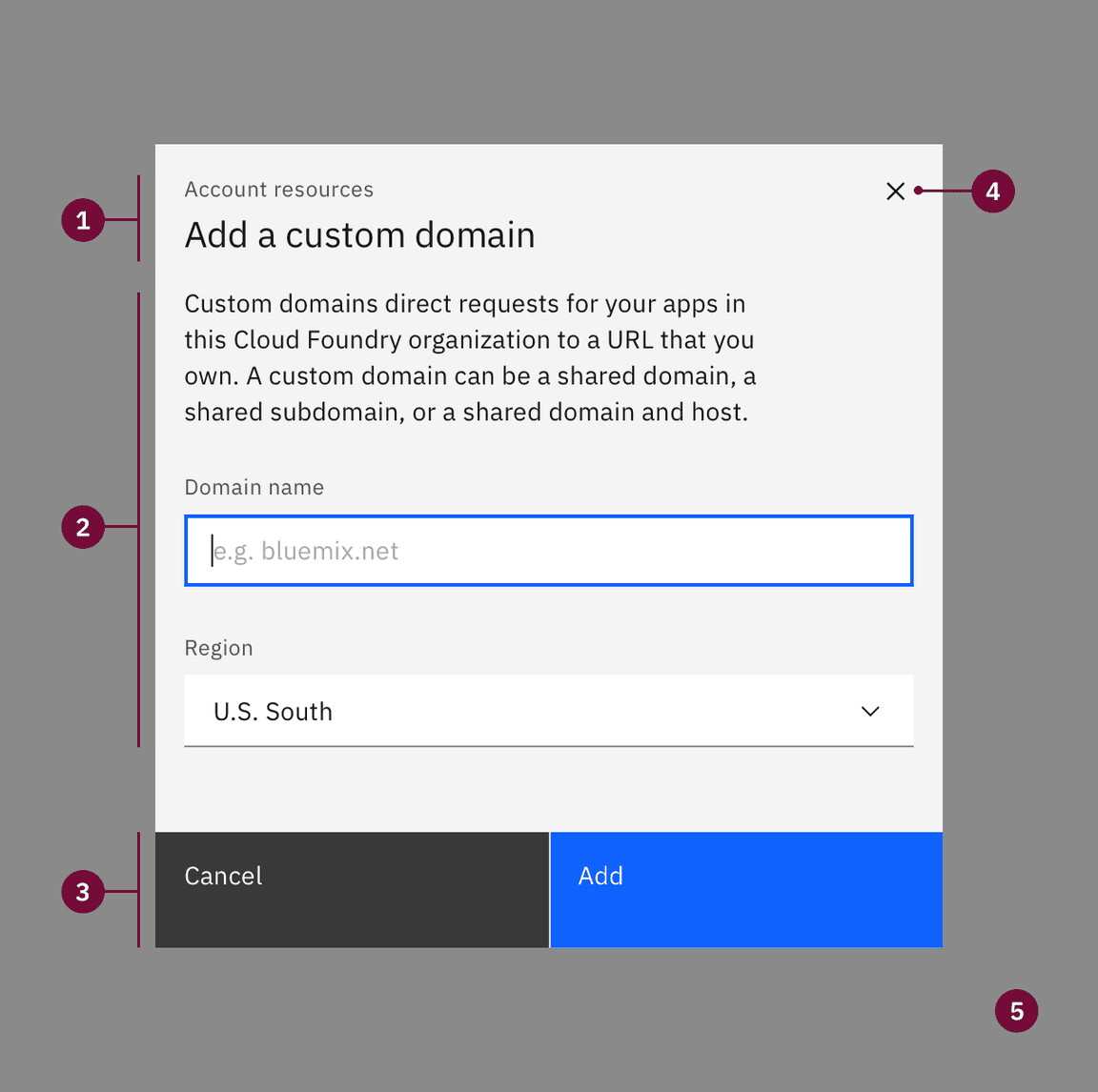
The modal has three distinct zones: A header, the body, and a footer. Components, for example a data table, form or, progress indicator, can occupy the full width of the modal.
-
Header: Includes a title, optional label, and the close icon.
-
Body: Contains the information and controls, or both that are needed to complete the modal’s task. It can include message text and components.
-
Footer: Contains the main actions needed to complete or cancel the modal task. Button groupings change based on the modal variant.
-
x: The close x icon will close the modal without submitting any data.
-
Overlay: Screen overlay that obscures the on-page content.
Sizing
There are four responsive modal sizes: extra small, small, medium, and large. Choose a size that works best for the amount of modal content you have. Modals with brief text should be extra small or small to avoid long single lines; for complex components, like a data table, the default or large modal is more suitable.
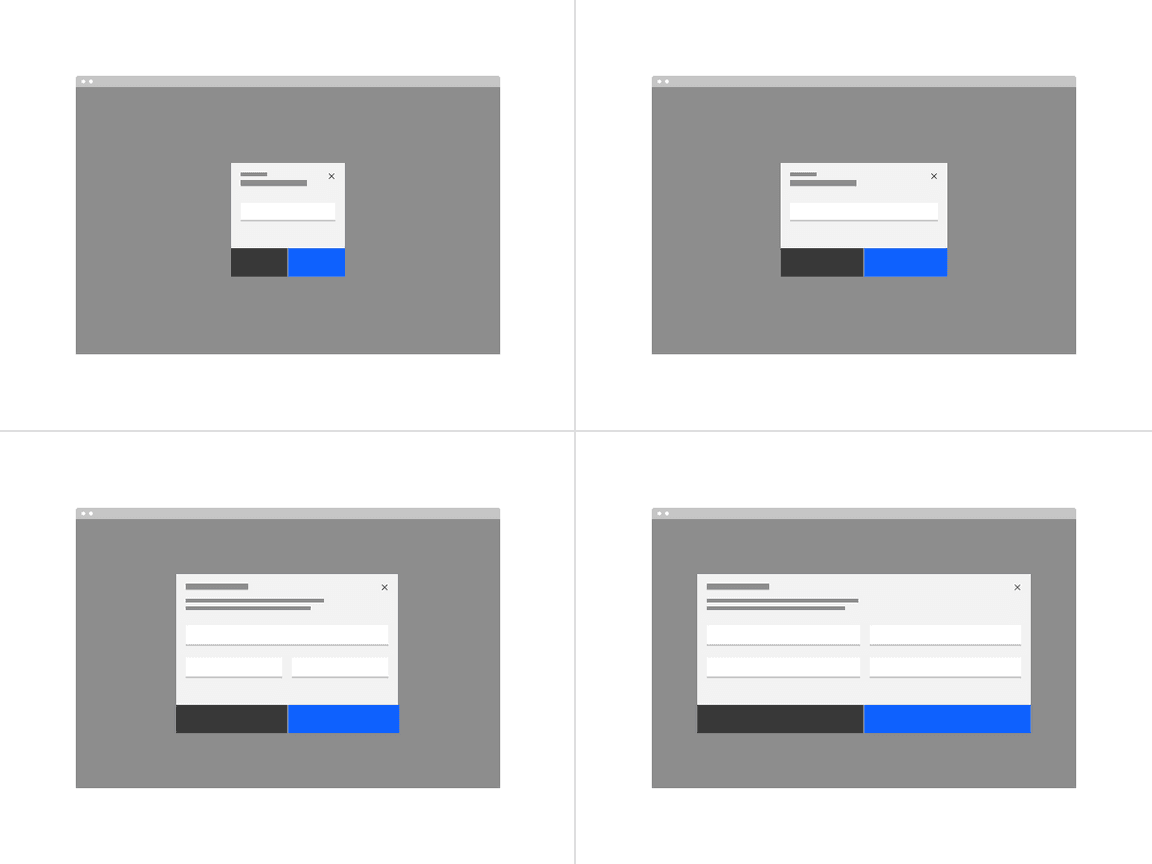
Max heights
To maintain a proper window ratio, each modal size has a maximum height. If your modal has too much scrolling because of a maximum height limitation, consider using the next modal size up. If the large modal height is still not enough space then a full page might be needed instead.
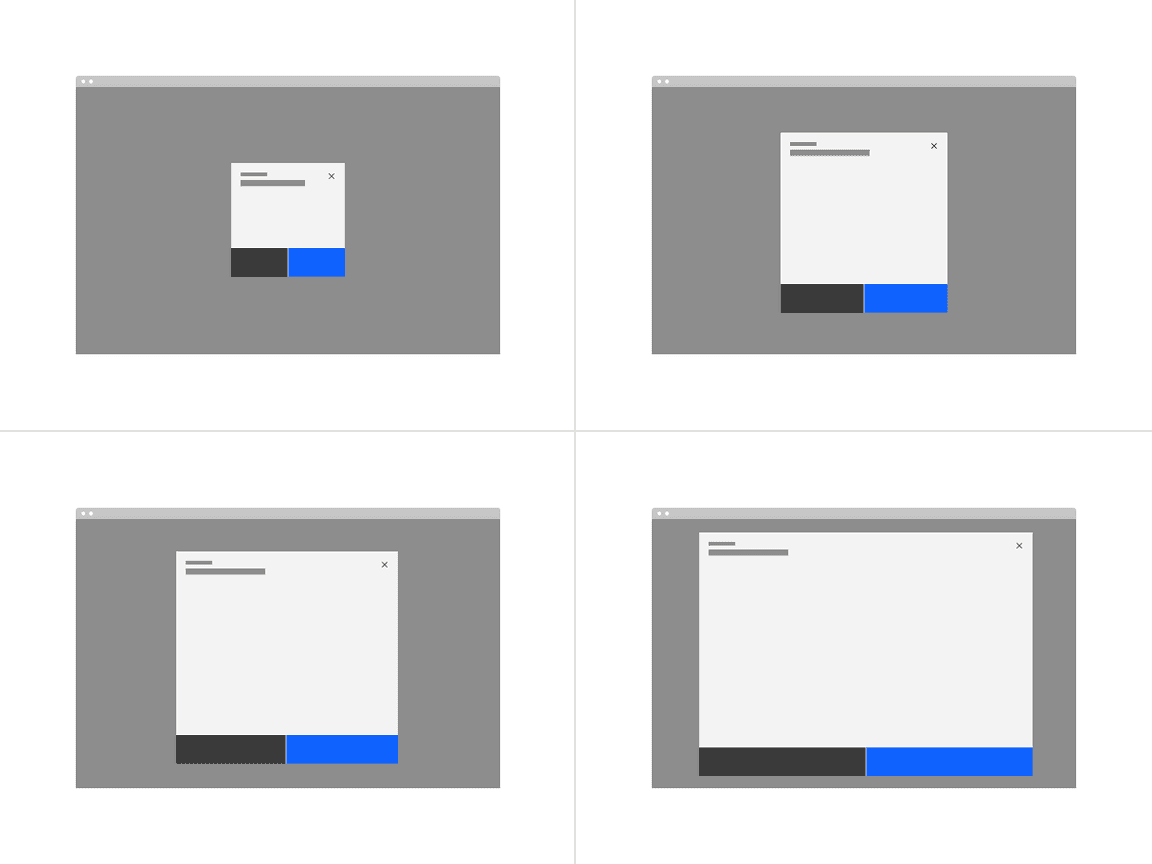
Alignment
In a modal that has larger breakpoints and larger breakpoints, body copy, including titles, use a 20% margin-right. However, form inputs and other components expand the entire width of a modal.
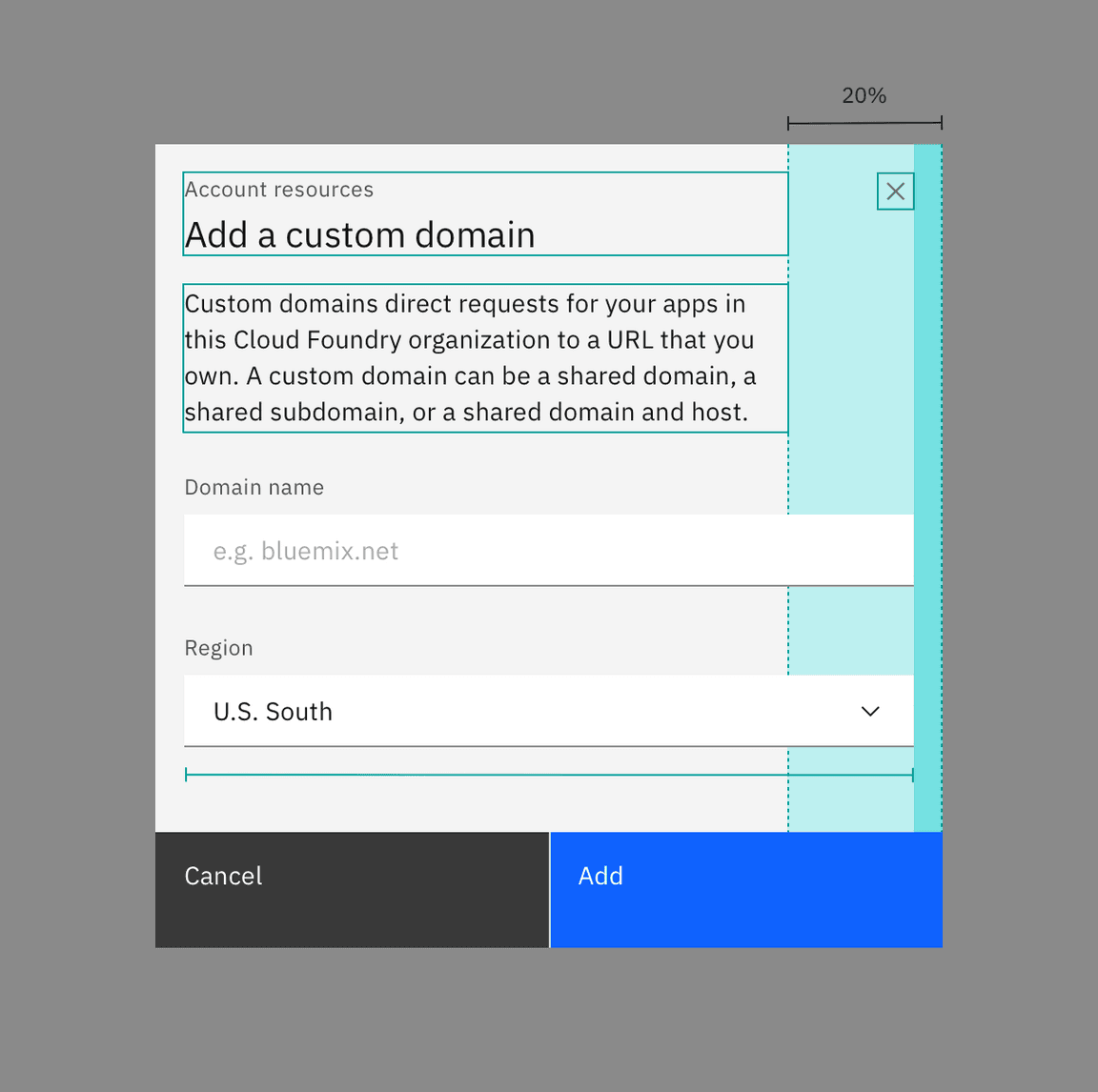
Full-width content
Certain components, such as a structure list or table, can expand into the margins of the modal and align flush to the container edges. These components typically have border dividers or containers that extend beyond the text or icon. Labels or text of any kind should never be in the modal margins.
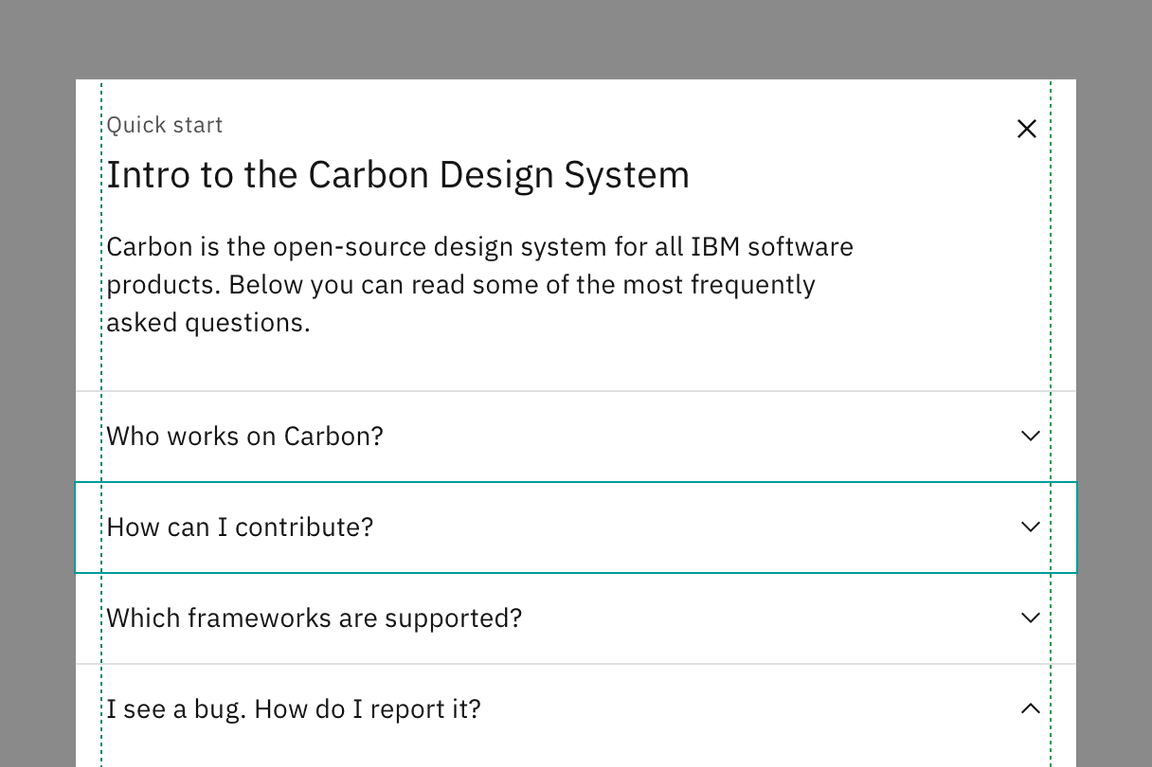
Content
In IBM Style, the modal is referred to as a dialog.
Title
- Use a brief verb phrase that describes the modal’s task or purpose.
- If the modal is accessed by clicking a button, use the button label for the
modal title:
- For example, if the user clicks the Create access group button to open the modal, Create access group is the modal title. Modals might also be accessed by clicking a menu item or an icon.
- Be aware of situations where there’s a tendency to mix and match button or icon labels and modal titles. For example, if the icon name is New user, use New user as the modal title, not Create user.
- If your product has a more conversational tone, use articles (a, an, the) in the modal title even though the button label doesn’t include the article, for example Create an access group.
- Sometimes, you might need to provide contextual information for the modal,
such as when the actions performed using the modal apply to a specific item
and you want to make it clear which item the actions apply to.
- In this case, you can use the optional label that is displayed above the title.
- For example, if the user needs to know the path to the object that they are editing, you might put the path in the optional label.
Modal description
If the purpose or goal of the modal is not readily apparent, provide a sentence or two of embedded assistance to help the user understand the modal or to provide examples to explain how to use the modal. If the title and the purpose are clear, such as Edit object for the title when the purpose of the modal is to edit an object, a description is not needed.
Body content
- Include only fields, components, and embedded assistance that are relevant to completing the current task.
- Ensure that the text is 80% of the modal’s width. The components can span 100% of the width.
- To add a link to IBM Documentation, include it as a link in the body of the
modal.
- Use a clear label, such as Learn more about topic or IBM Docs.
- Ensure that the URL is easy to update
Buttons
-
For action button labels, use active words that describe the purpose of the modal, such as Add, Delete, and Save. For a list of approved action labels, see the Carbon content guidelines.
-
Avoid vague or passive words, such as Done or OK.
Overflow content
When the modal content is longer than the modal height then the body section should scroll vertically with the header and footer remaining fixed in place. The content should visibly fade at the end of the modal body area to indicate there is additional content out of view.
Modal content should never scroll horizontally; instead, use a larger size modal.
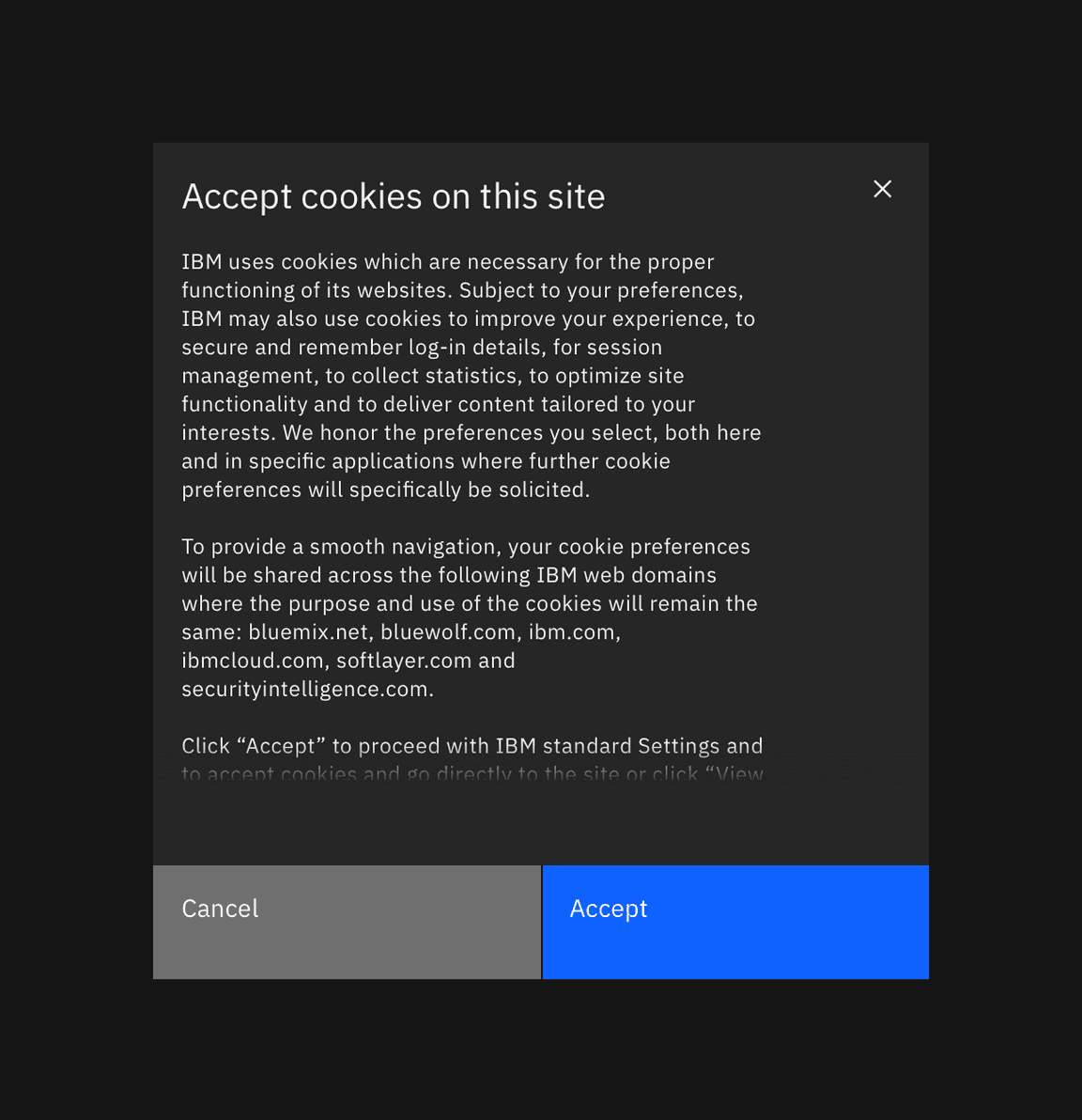
Title as message
For short, direct messages the title can include the whole message to add visual clarity to an otherwise repetitive title and body message. When using this style, no other body copy may be included.
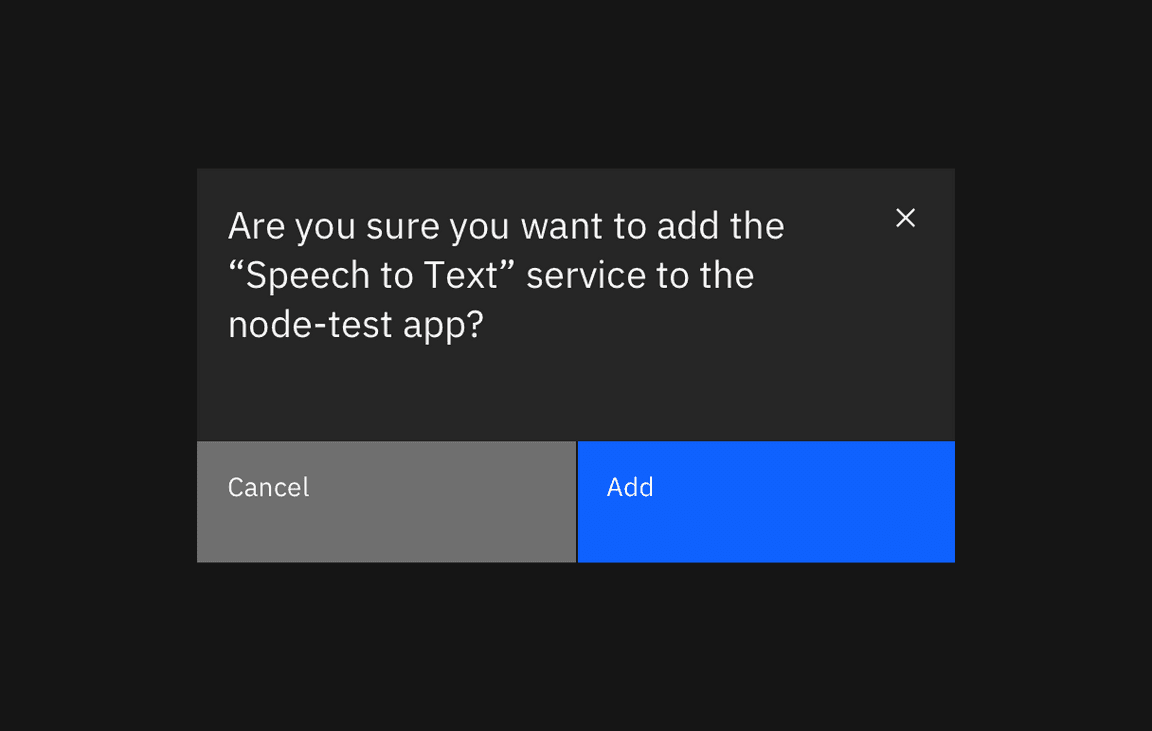
Further guidance
For further content guidance, see Carbon’s content guidelines.
Universal behaviors
Trigger
Modals are triggered as a result of a user’s action and are not system generated. Common components that can trigger a modal include, button, link, or icon. On a keyboard, selecting
Enter
Space
Focus
Once the modal is open, set the initial focus to the first location that accepts user input. For example, if the modal contains a form then the focus should automatically be set to the first field when opened. If it is a transactional modal without form inputs in the body section then the first focus should be on the primary button.
Focus should then remain trapped in the dialog until it is closed. When navigating by keyboard,
Tab
Shift-Tab
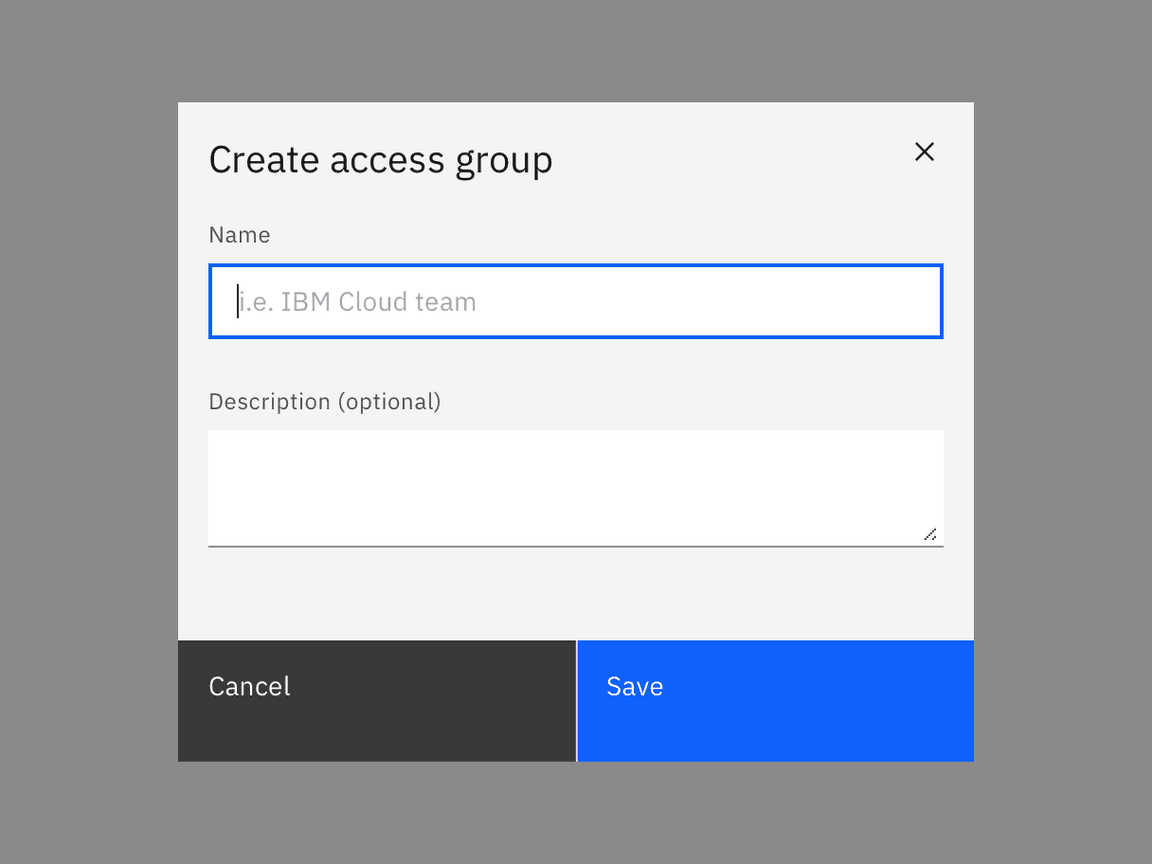
Loading
The task completion action should take place immediately. If a longer loading period is needed, a loading spinner and overlay should appear on top of the modal body area with content disabled. The primary action button should be disabled while loading is in progress.
If a quick loading period is needed, use an inline loading behavior on the primary button to indicate the data is being processed.
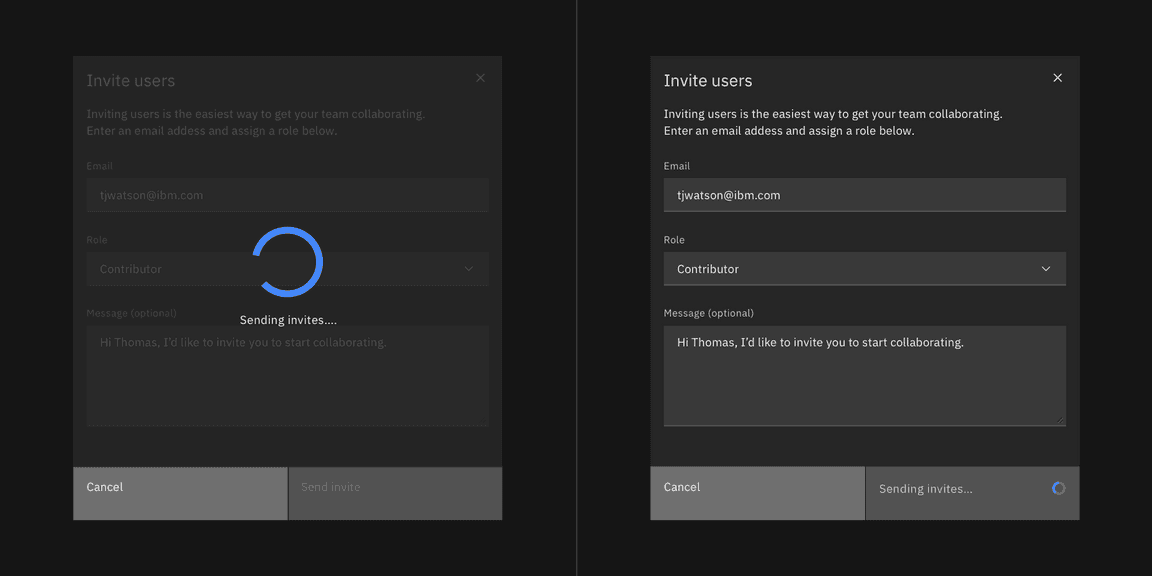
Validation
Validate a user’s entries before the modal is closed. If any entry is invalid then the modal should remain open with the entry marked in an error state and include an inline error message. The message should inform the user what has happened and provide guidance on next steps or possible resolutions. Effective and immediate error messaging can help the user to understand the problem and how to fix it.
When possible, validate the user’s data before submission. This kind of inline validation (aka client-side validation) should happen as soon as the field loses focus. This will help easily identify the elements that need to be corrected. In-field error messages should disappear when the form criteria is met. If the data was not able to be submitted due to server-side issues, an inline notification should appear.
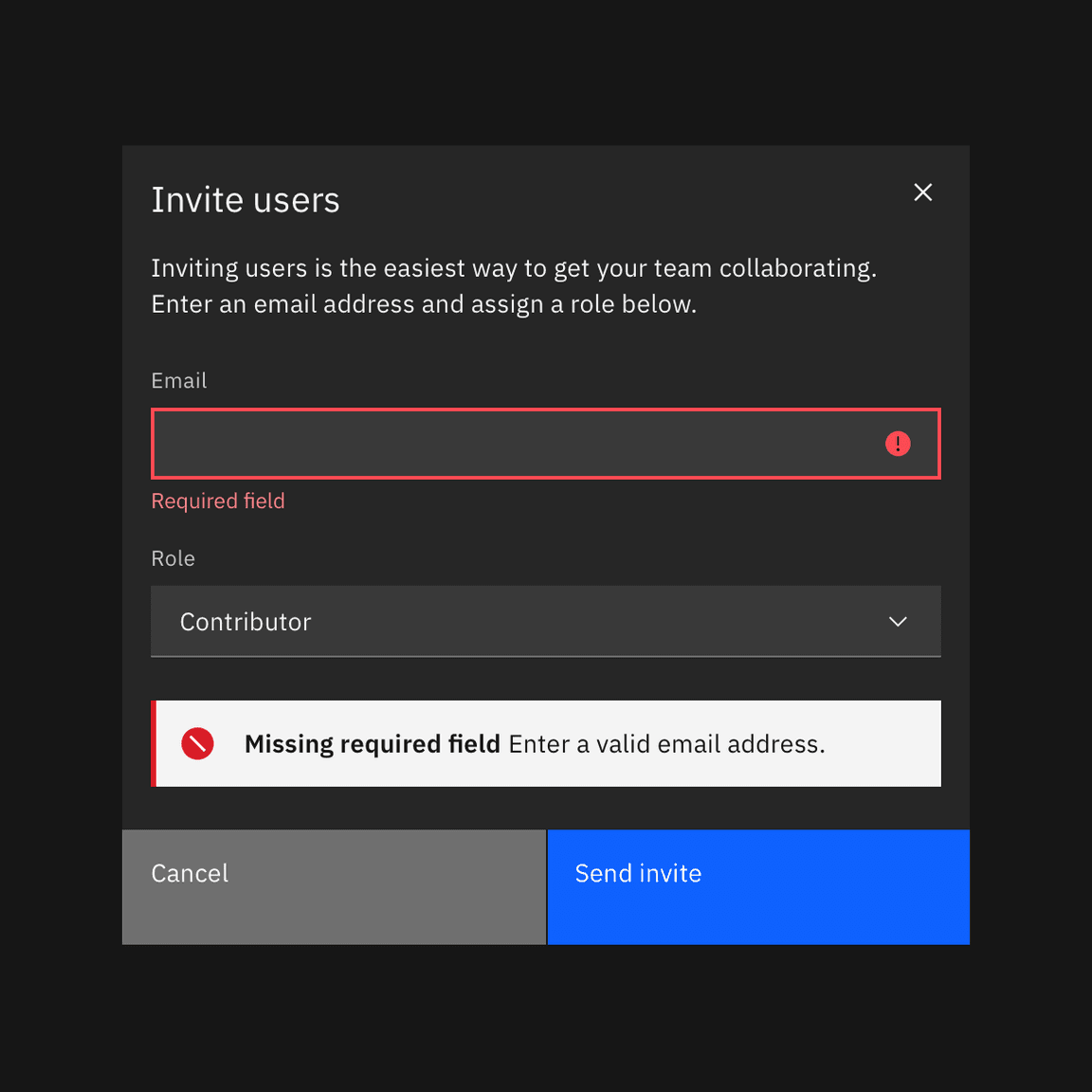
Modal variants
Passive modal
Passive modals presents information the user needs to be aware of concerning their current workflow. It contains no actions for the user to take and should not include any data that needs to be submitted. They serve as a type of notification alerting the user to urgent information such as reporting system errors or conveying a consequence of a user’s action.
Dismissing a passive modal
Passive modals are persistent until dismissed in one of the following ways.
- x: Clicking the close x icon in the upper right will close the modal without submitting any data and return the user to its previous context.
- Click elsewhere: Clicking outside the passive modal area will automatically close the modal.
- Esc: Pressing on the keyboardESC
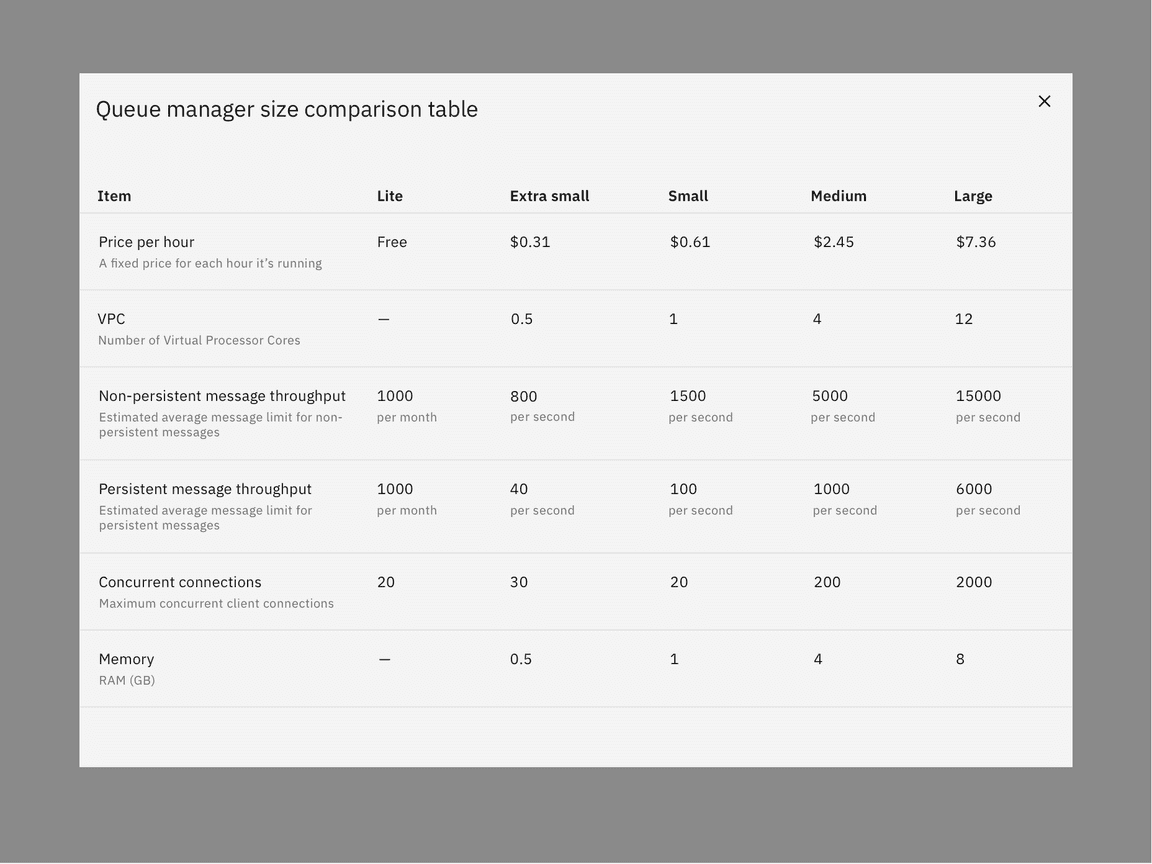
Transactional modal
Transactional modals are used to validate user decisions or to gain secondary confirmation from the user. Transactional modals require an action to be taken in order for the modal to be completed and closed. It contains a cancel and primary action buttons.
Dismissing a transactional modal
Transactional modals are persistent until dismissed in one of the following ways.
- Task completion: Clicking the primary action will complete the task and automatically close the modal.
- Cancel button: Clicking the cancel button will close the modal and return the user to its previous context. Cancel undoes all applied changes.
- x: Clicking the close x icon in the upper right will close the modal without submitting any data and return the user to its previous context.
- Esc: Press ESC on the keyboard.
Two buttons
When using two buttons, the secondary button is on the left and the primary button is placed on the right. Each button spans 50% of the modal and are full bleed to the edge.
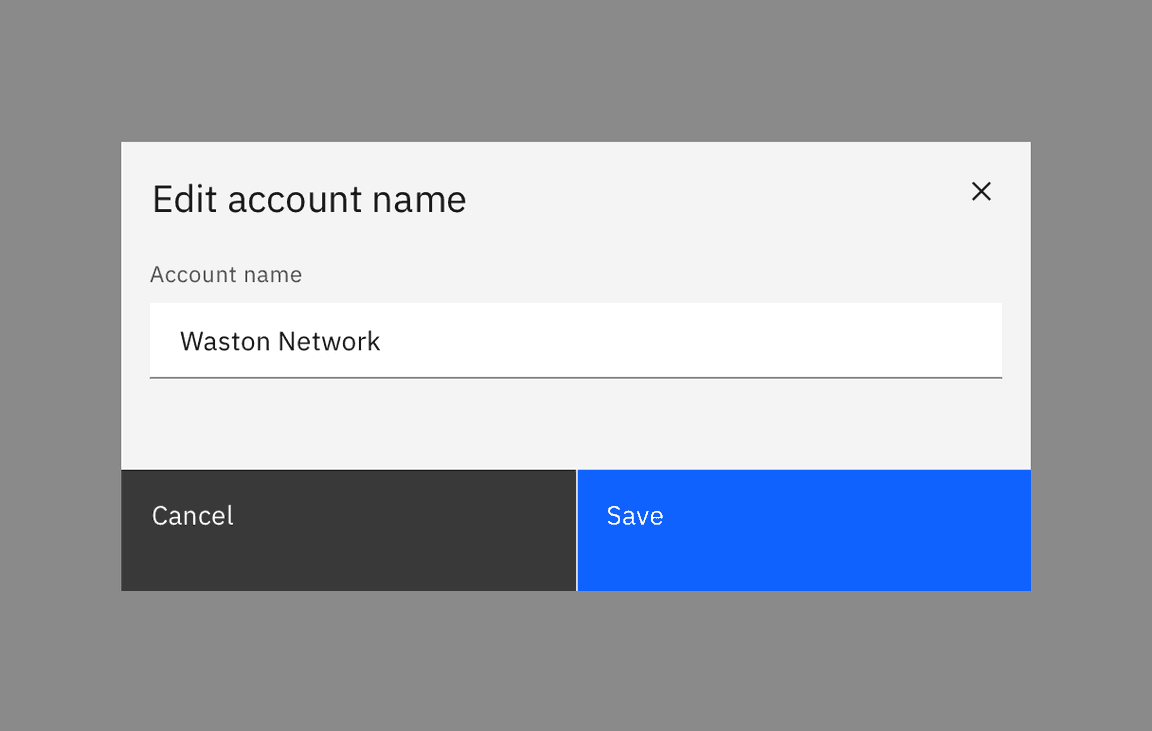
Three buttons
In the rare case where three buttons are needed, each is 25% of the modal width and aligned to the right side of the modal. Only the outmost right button is allowed to be a primary button with the other two being secondary buttons. If all three actions have the same weight, all three should be secondary buttons.
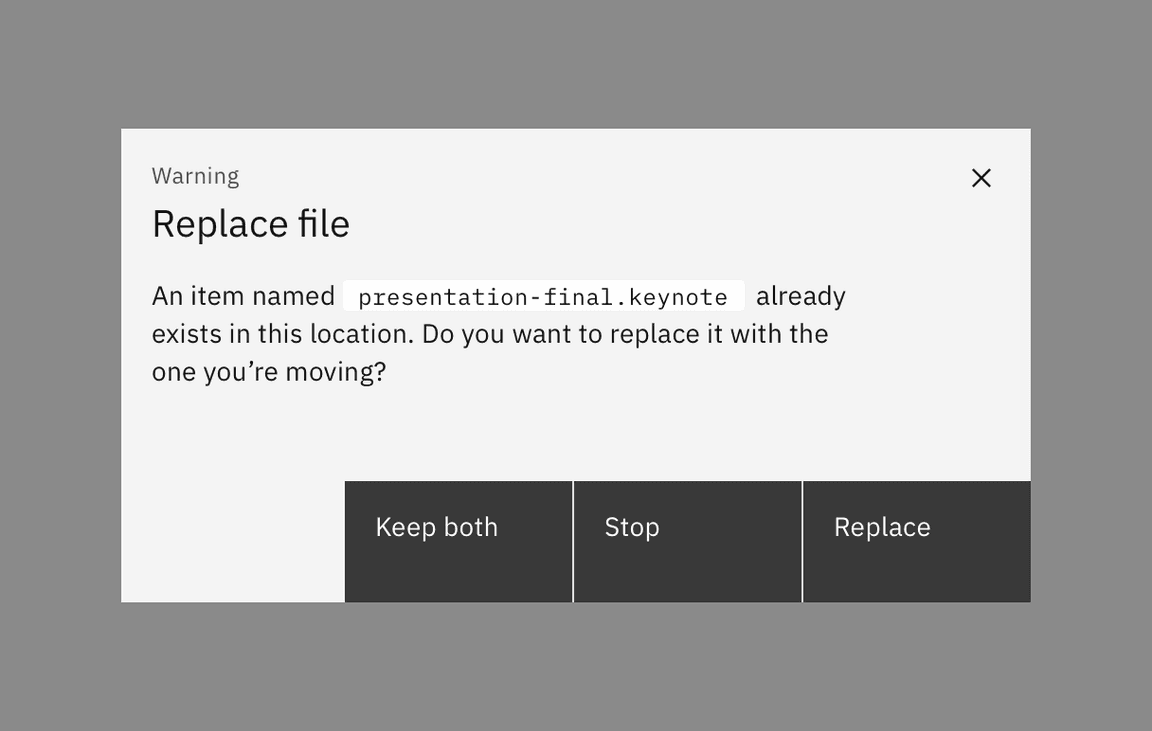
Danger modal
Danger modal is a specific kind of transactional modal used for destructive or irreversible actions. In danger modal, the primary button is replaced by a danger button. They are commonly used in high impact moments as a confirmation for an action that would result in a significant data loss if done accidentally.
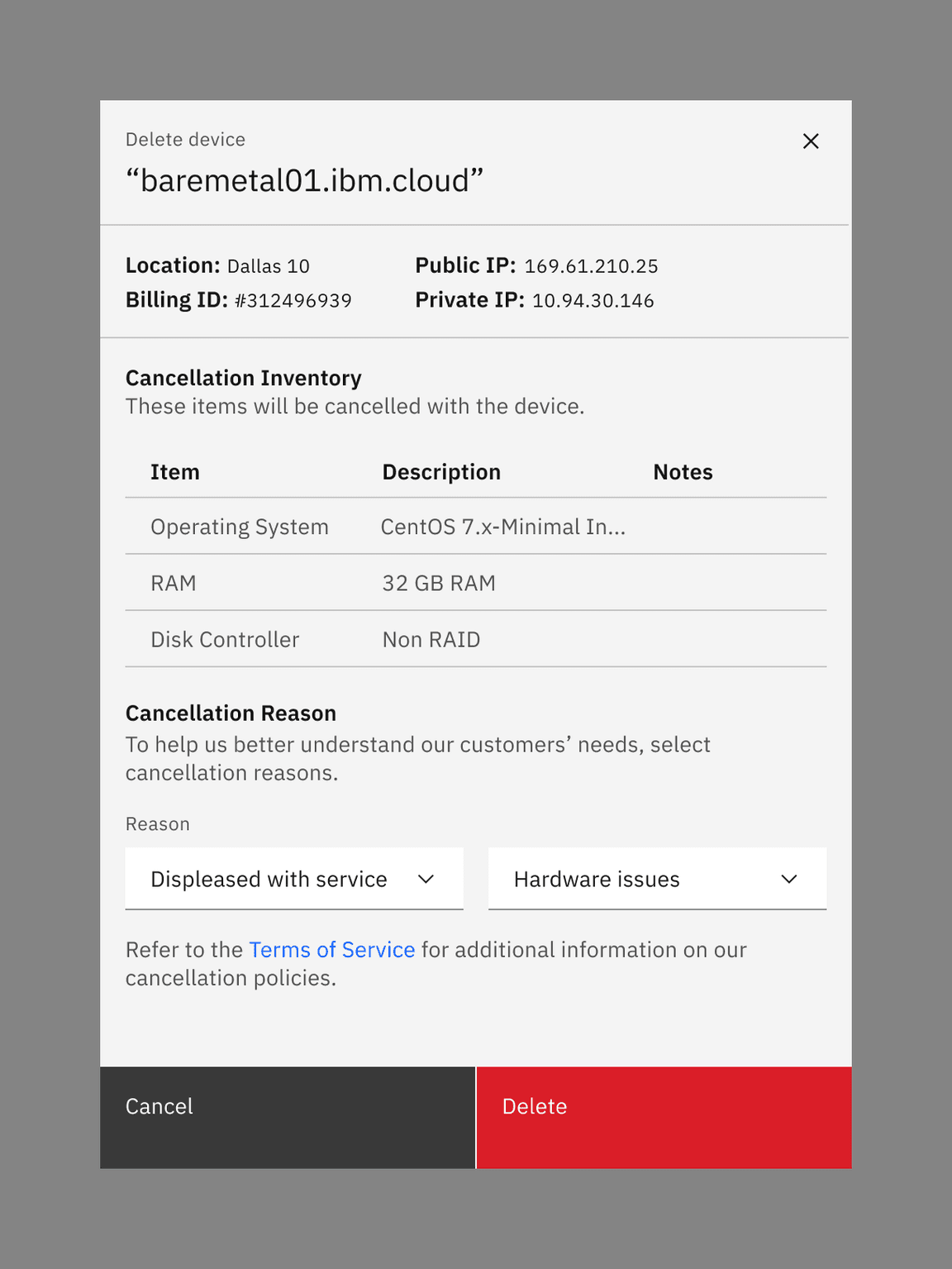
Acknowledgment modal
Acknowledgment modals are used when the system requires the user to acknowledge the presented information. It contains only a single button, commonly OK. Acknowledgment is confirmed when the user clicks the primary button.
Dismissing an acknowledgment modal
Acknowledgment modals are persistent until dismissed in one of the following ways.
- Task completion: Clicking the primary action will complete the task and automatically close the modal.
- x: Clicking the close x icon in the upper right will close the modal without submitting the user’s acknowledgement and return the user to the previous context.
- Esc: Press on the keyboard.ESC
Single button
Single buttons are placed on the right side, span 50% of the modal, and bleed to the edge. In most scenarios, a primary button is used when one button is needed.
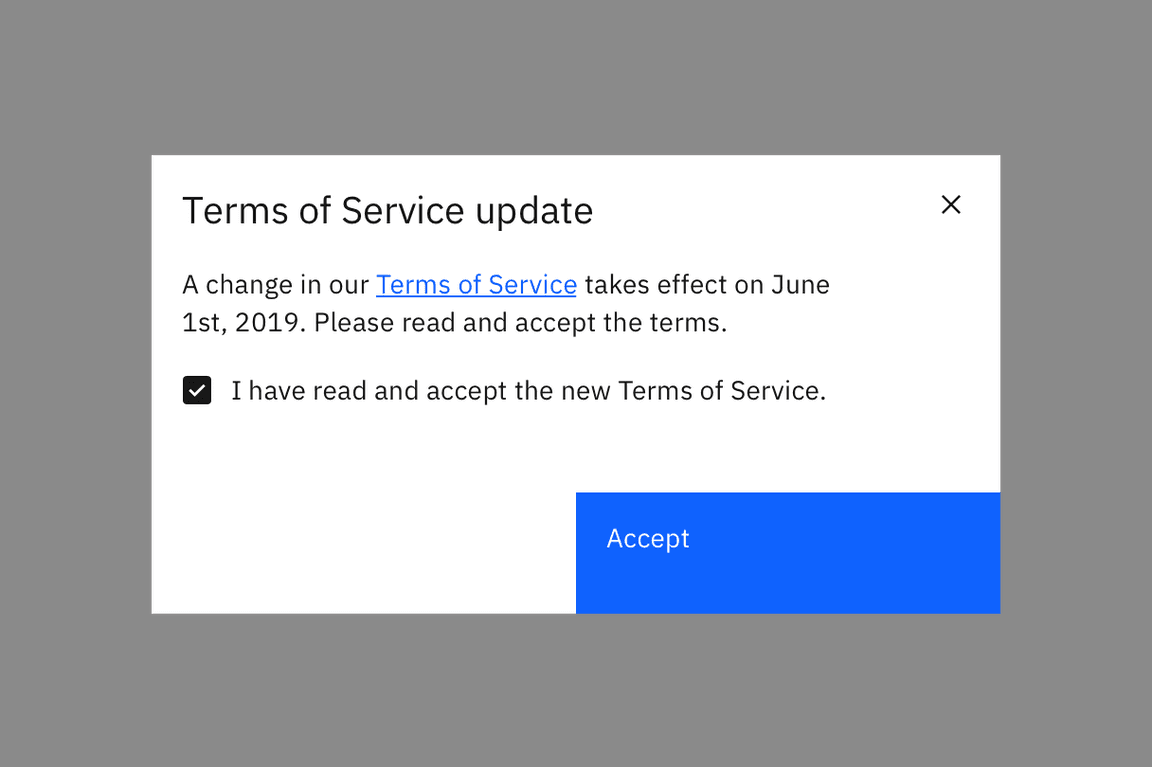
Progress modal
For longer tasks, use a progress modal to give the user a sense of completion and orientation within the focused flow. For complex flows with complex choices, consider using a full page instead of a modal. A progress modal is not a solution for excess modal content. It should only be used to present information in more consumable and focused chunks.
Dismissing a progress modal
Transactional modals are persistent until dismissed in one of the following ways.
- Task completion: Clicking the primary action will complete the task and automatically close the modal.
- Cancel button: Clicking the Cancel button will close the modal and return the user to its previous context. Cancel undoes all applied changes.
- x: Clicking the close x icon in the upper right will close the modal without submitting any data and return the user to its previous context.
- Esc: Press on the keyboard.ESC
Button group
There are three buttons in the progress modal footer: Cancel, Previous, Next. Each button’s width is 25% of the modal window and are full bleed. Previous and Next are grouped together and placed on the right half of the dialog, with Previous as a secondary button and Next as a primary button. In the last step of the sequence, the Next button label should change to reflect the final action. The Cancel button is aligned to left side of the modal and uses a ghost button.
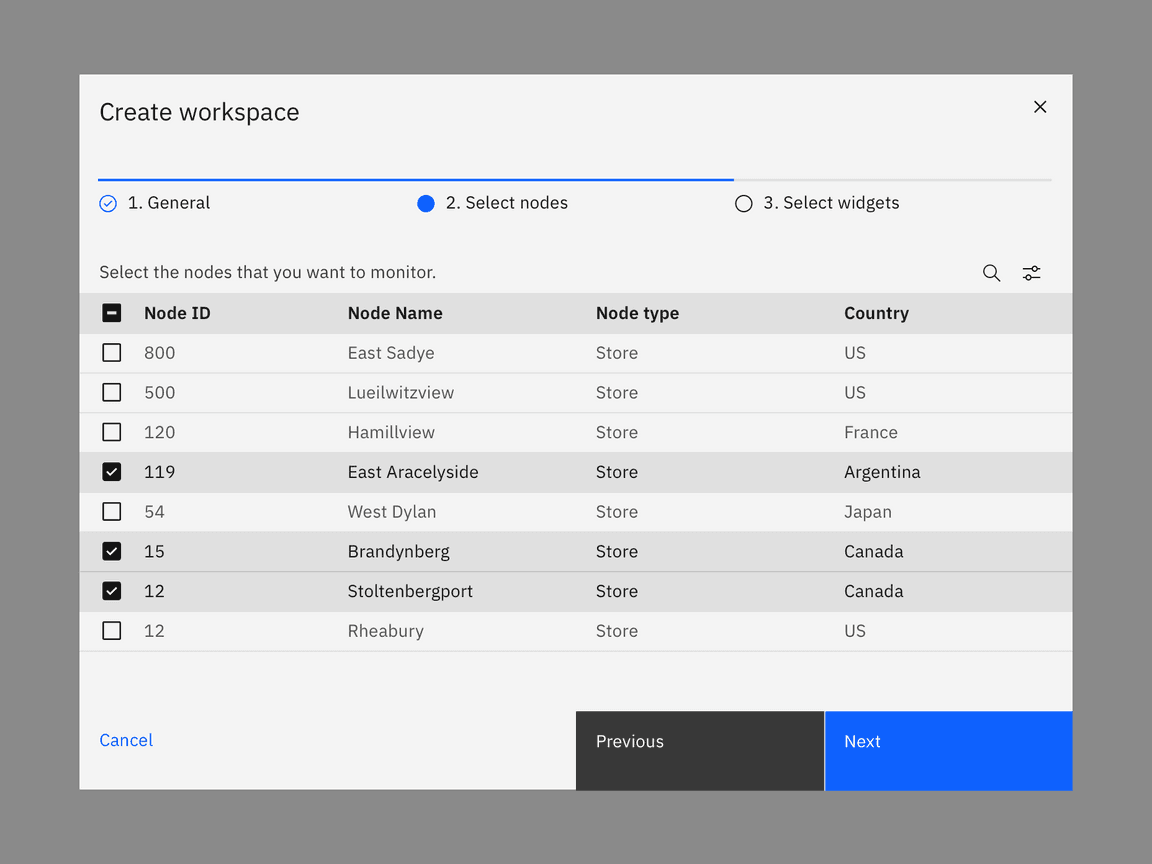
AI presence
The modal component has a modification that takes on the AI visual styling when AI is present in the entire container. The AI variants of a modal function the same as the other modal variants except for the addition of the AI label, which is both a visual indicator and the trigger for the explainability popover.
AI in modal can appear in two ways: broadly, over the whole modal, or focused, just in certain parts of the modal. When the entire modal is styled for AI, it indicates to the user that AI is present in all aspects of the modal. If only a limited amount of the modal content is generated by AI, then only those components should receive the AI presence styling, not the entire modal.
For more information on designing for AI, see the Carbon for AI guidelines.
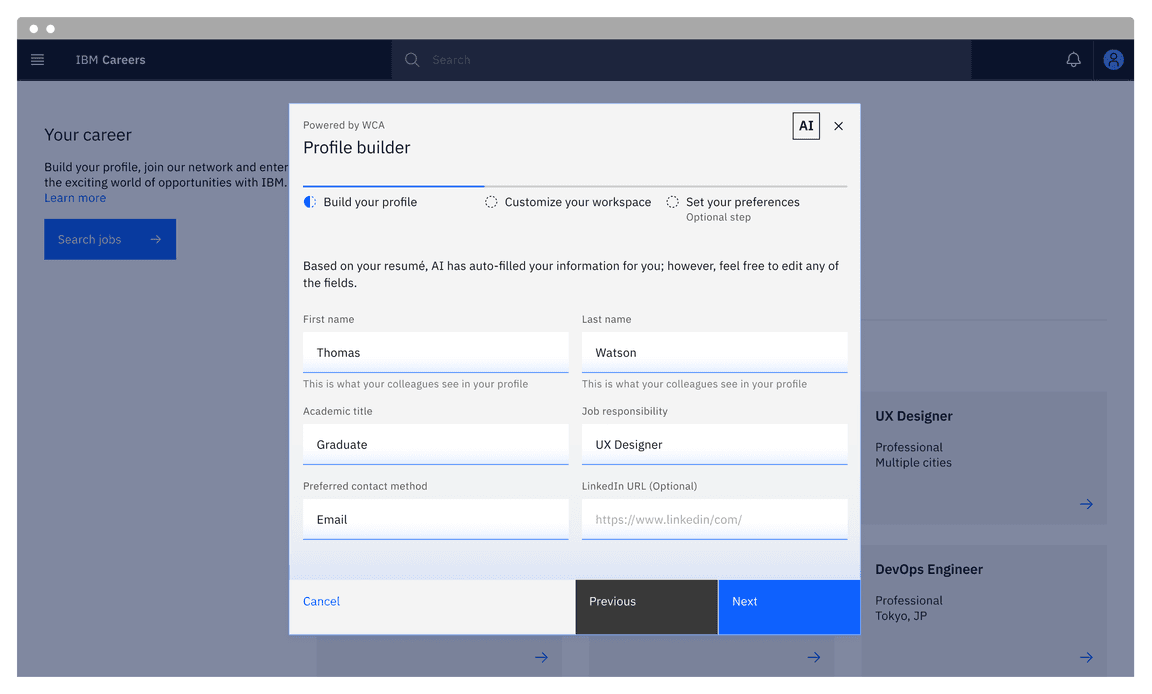
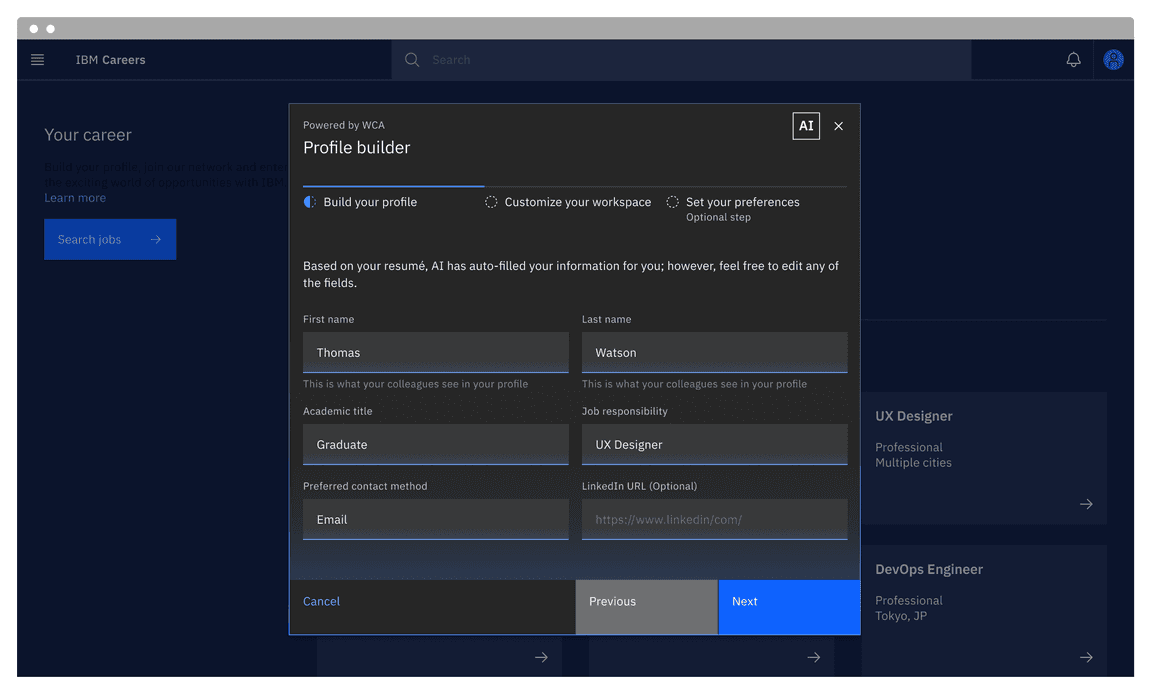
Related
Modal versus notification
Modals are highly disruptive and block tasks until dismissed by the user. A modal should only be used as a form of notification if it provides the user with critical information immediately related to their task. For non-critical messaging, consider using a toast or inline notification instead of a modal. Toast and inline notifications provide users with non-disruptive feedback or the status of an action without breaking their workflow.
Components
Patterns
Feedback
Help us improve this component by providing feedback, asking questions, and leaving any other comments on GitHub.